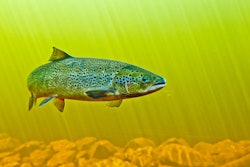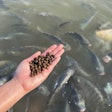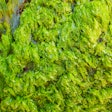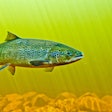
Adapted from a press release.
Finnish mycoprotein company, Enifer, announces it has secured funding to build a unique food-grade mycoprotein factory in Kirkkonummi, Finland.
The factory, which will be completed by the end of 2025 and projected to cost EUR33 million (US$35.7 million), will convert food industry side streams into Enifer’s sustainable PEKILO fungi-based protein ingredients, which is designed as a drop-in ingredient for food producers looking for a sustainable protein source.
The company also offers PEKILOAqua, which is designed for farmed fish and expected to be commercially available in 2027. In 2021, Enifer began a collaboration with Skretting, the aquaculture buinsess line of Nutreco. Nutreco's trials in 2023 showed PEKILOAqua is suitable for moderan commercial fish feed.
Its other product, PEKILOPet, is said to be highly digestible and palatable to both cats and dogs. PEKILOPet is produced from renewable raw materials using fermentation and contains 60% protein and 30% fiber, along with smaller amounts of fat, minerals and vitamins. In 2022, Enifer joined the Unleashed by Purina accelerator program, and the company expects a commercial version with industrial volumes of PEKILOPet to hit the market in 2026.
Enifer said the Finland plant will be the world's first commercial plant to produce such a mycoprotein ingredient from sidestream raw materials.
The factory will produce up to 3,000 tons of PEKILO a year. The production of PEKILO mycoprotein has a low carbon footprint and requires minimal land and water, making it a very sustainable alternative to animal and plant proteins.
Alternative proteins needed to feed growing populations
The new funding package comprises a new EUR15 million Series B equity funding round led by the Finnish private equity fund Taaleri Bioindustry Fund I, with follow-on investments from existing shareholders Nordic Foodtech VC, Voima Ventures, Valio, and Laine Holding. This funding is complemented by the Finnish Climate Fund, which has extended a EUR7 million capital loan to support the project and a EUR2 million Climate and Environmental Loan provided by Finnvera. This funding comes on top of the previously reported EUR12 million recycling and reuse investment grant from Business Finland, making the factory fully funded.
“We believe that there is an increased need for alternative proteins as the global population grows," said Tero Saarno, managing director, Taaleri Bioindustry. "Demand is also supported globally by environmental and ethical considerations. Taaleri Bioindustry Fund I’s investment enables commercial scale production. We are confident in Enifer’s opportunities to expand."
The world's population and the need for protein are growing, said the Finnish Climate Fund's acting CEO Toni Mikkonen. "Food production is – even at the level of technologies that can already be scaled – an unsolved key part of the climate challenge," said Mikkonen. "In the future, sustainable food production will be based on several different solutions and the demand for new types of proteins is predicted to grow significantly over the next decade. Enifer's already tested technology is interesting as the nutrients of various side streams can be upcycled and their processing value increased instead of energy use."
Facility will produce 500 kilograms per hour of mycoprotein
The factory will be built as a brownfield project within an existing industrial building in Kantvik, Kirkkonummi, Finland. The site bordering the Baltic Sea is only a 30-minute drive from Helsinki city center and Enifer’s existing R&D facilities. The site also offers all the required utilities, including steam, electricity, process and cooling water, and waste-water treatment. The factory will begin ramping up operations in 2026, and once it is at full capacity, it will produce 500 kilograms per hour of mycoprotein.
PEKILO mycoprotein is produced by cultivating a specific species of fungus in a fermentation process that is not too distinct from brewing beer or making soy sauce. The produced PEKILO mycoprotein powder contains a lot of high-quality protein and fiber. It is also neutral in color and taste, making it an excellent source of nutrition in the most diverse food applications. Enifer and its partners have already demonstrated its use across meat and dairy alternatives, baking, pastries and snacks.
At its core, the factory will harbor a full-sized industrial fermenter, standing more than 12 meters tall and measuring more than 4.5 meters in diameter, in which the PEKILO mycoprotein is grown. The factory will directly employ some 15 people during regular operations and more than twice this number during construction and commissioning.
The PEKILO fermentation process was originally developed in Finland in the 1970s and used to upcycle forest industry side streams into feed-grade mycoprotein. Enifer has breathed new life into this unique innovation, adapting it to new raw material streams from food and agricultural industries and developing a food-grade version of the mycoprotein ingredient.
The company will file for Novel Foods approval of the novel ingredient in 2024 and expects to receive approval during 2026.
“At Enifer, we’re extremely excited to announce the kick-off of our first factory investment project," said Simo Ellilä, CEO and cofounder of Enifer. "For over half a century, Kantvik has been at the heart of Finnish bioindustries, and I could not think of a better location to bring PEKILO fermentation back to life. I would like to thank our new investors, in particular Taaleri Bioindustry and the Finnish Climate Fund, for joining us in our mission. Mycoprotein is the missing ingredient for a more sustainable food chain – the facility in Kantvik serves as a key steppingstone on our path to making mycoprotein a cornerstone of protein supply, with several future factories already being planned."

















